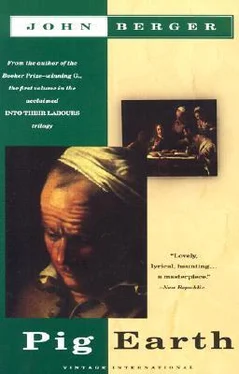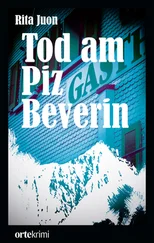Around the next bend of the road is the house in which the Cocadrille lived her second life. Beside the house there is a rock, as tall as the roof, with an ash tree growing on top of it. You have the impression that the house is jutting out into the road, edging away from the precipice behind its back. It was originally built before the First World War for a roadmender. He lodged there with his horse during the few weeks of the year when he was working on that isolated stretch of the pass. With the advent of lorries, the house no longer served any purpose and so was locked up and the key kept in the Mayor’s office. The Mayor’s wife’s proposal had been that the Cocadrille should live in the roadmender’s house rent-free. There, she would be far enough away from the village to cause trouble to nobody, and the law would not have to be invoked against her.
If you approach the roadmender’s house from the opposite direction, you don’t see it until you are beside it, for it is completely hidden by the rock with the tree on top of it. The rock is like a second house that has been filled with stone. From the direction I was approaching I could see a window, which had no curtains, in the house which was lived in.
I knocked on the door.
Who is it?
Jean.
You’re too late.
It’s not half past eight.
The door opened a fraction.
What do you want?
I have come to fetch my haversack.
At this hour!
I won’t come in.
Now she opened the door fully.
I’ll pay you a coffee.
The room was full of sacks and cardboard boxes, there were two piles of wood and so far as I could see, only one chair at a table, on which there was a pile of old newspapers, a heap of hazel-nuts and some knitting. The blue umbrella stood in a corner. The ceiling was smoked dark brown like the hide of a ham. The room was the size of a small lorry.
She continued doing what she must have been doing before I knocked. She gathered the hazel-nuts into a basket and hung them on a pair of scales, the traditional kind made of iron, which, on the banknotes of some countries, the figure of Justice holds up in front of her bosom.
Shit and shit! she grumbled. I can’t see in this light.
I put on my glasses and looked over her shoulder to read the markings on the iron bar.
Six kilos, three hundred, I said.
She smelt of the floor of a forest into which the sun never penetrates, she smelt of boar.
After they were weighed she put the nuts into a cardboard box.
I haven’t had a visit for three years. I had to strain my ears to hear her. She was speaking as if to herself. The last visitor I had was Monsieur le Curé in July 1964. They put me here to get me out of the way. Why don’t you take your glasses off? They make you look like a curé.
If you can’t read, you should wear glasses yourself.
Read! she cawed. Read!
From the pocket of her apron she took out a packet of tobacco and slowly rolled herself a cigarette. On the stove she moved a saucepan of milk to get a light from the burning wood.
If I turn my back you spill over, she said to the milk.
A cock came through the door from the adjoining stable. It stood there, one claw poised in the air.
Sit on the chair! she said. It was the last curé, not this one. He was always in bad health. He’d climbed up here on foot on his way somewhere. I offered to pay him a glass of water. Ah, he said, as soon as he came in: You are a child of the earth, Lucie. Without land, I said. You must not harbour resentment, he told me, you have things to be grateful for. I knew what he meant. Like this house you mean — everybody whispers that I don’t pay rent for it and what a shack it is! It was built for one man and a horse — she lifted the milk off the fire — and when the horse died it wasn’t lived in any more. I’m the only woman who ever slept in this house. I asked the curé to name one other woman in the village who would live here alone. None of them is a child of the earth, he repeated. I will show you one day what I am, I said, I’m going to surprise you all! It is dangerous — I remember how solemn his voice was — to hope too much; you cannot please the world and there is no reason to envy it. She shooed the cock away into the stable. Father, I said, I believe in happiness! And do you know what happened then? His face went white and he grasped my arm. Lucie, is there a little more water? he whispered. I gave him some gnôle and he drank it like water. He started to speak as if he were reading the Bible in church. It is written, sadness has killed many, and there is no profit in it. You are right, my daughter, to believe in happiness. Lie down, Father, I told him, and rest a moment. Where? he asked, I see no bed. I got him to the table. He lay down, closed his eyes and smiled. The angels, he murmured, who descended and ascended on Jacob’s ladder, they had wings, yet they did not fly and they trod the gradual rungs of the ladder. I held the glass for him and undid the buttons where his clothes were too tight. He never opened his eyes. He will be ashamed when he wakes up, I said. He heard me say this because he spoke: I’m ashamed now but I feel better. Slowly, Father, I said, let your strength come back slowly. That was the last visitor I had. She poured out some coffee.
Haven’t Henri or Edmond ever visited you?
It was then that she told me the story of her brothers and the maquisards. She told it squatting on a sack beside the stove. The kitchen grew darker and darker. I could see nothing except the orange of the fire in the stove and her white hair which gave off a glimmer of light. Outside there was a hard moon. They are traitors, she added, when she had finished the story.
Traitors?
It was they who informed the Milice.
Have you any proof?
I don’t need proof. I know them too well.
Why should they have done that? The war was nearly over. Everyone saw the Germans were losing.
What kind of patriot were you? she hissed. A thousand kilometres away.
Ten thousand, I said.
She spat and rubbed the spittle with her foot on the floorboards.
The only time my brothers came here was when they brought my furniture. They made excuses all day saying they had to finish planting the potatoes. It was in April 1949. Only after they had eaten their soup did they load the cart. Then we set out under cover of darkness. Do you know why? In the daylight they were ashamed to be seen moving their sister out. When we arrived here, it was as dark as it is now. My own brothers, fed on the same mother’s milk, sperm of the same father’s sperm, left me here in the dark one night. I didn’t even have a lamp. Each month they were meant to pay me. Pay my arse! I saw the last of them that same night through the window there.
I watched the cart go, she continued, and when I knew it was far away, I followed it. I went as far as the Madonna. She walked to the dark window in the room and stood looking out through the glass.
There was a long white cloud in the shape of a fish, she went on, I have never seen it again. Where the fish’s eye should have been was the moon. I waited there at the foot of the Madonna’s column and I spoke to Maman and Papa. You should have known your sons better, I told them. You always thought of them as they were when they were in the cradle. Shit! You didn’t know where their evil came from, did you? You died, Papa, didn’t you, not knowing that to make a child you need a woman, a man and the Devil. That’s why it’s so tempting! I saw what Papa was doing at that very moment when I was standing at the Madonna’s feet. He was rutting into Maman. And Maman was pulling him down! When you were alive, you didn’t do it enough, did you, you were always too tired and your back felt too broken. Go on. I give you my blessing. Go on, I told them. You have nothing left here. Your sons will give nothing back to you. If you speak out loud, they won’t listen. If you stopped and saw me, you’d suffer. I’m not going to let you suffer, Papa, I’m not going to let you suffer, Maman, because I’m going to survive. You carcasses with your backs to everything! I’m not going to let you suffer. I swear it. I’m going to survive.
Читать дальше












